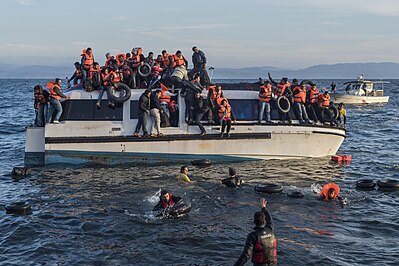Portal:European Union
Introduction
The European Union (EU) is a supranational political and economic union of 27 member states that are located primarily in Europe. The Union has a total area of 4,233,255 km2 (1,634,469 sq mi) and an estimated total population of over 449 million. The EU has often been described as a sui generis political entity combining the characteristics of both a federation and a confederation. Containing 5.8% of the world population in 2020, EU member states generated a nominal gross domestic product (GDP) of around US$16.6 trillion in 2022, constituting approximately one sixth of global nominal GDP. Additionally, all EU states except Bulgaria have a very high Human Development Index according to the United Nations Development Programme. Its cornerstone, the Customs Union, paved the way to establishing an internal single market based on standardised legal framework and legislation that applies in all member states in those matters, and only those matters, where the states have agreed to act as one. EU policies aim to ensure the free movement of people, goods, services and capital within the internal market; enact legislation in justice and home affairs; and maintain common policies on trade, agriculture, fisheries and regional development. Passport controls have been abolished for travel within the Schengen Area. The eurozone is a group composed of the 20 EU member states that have fully implemented the economic and monetary union and use the euro currency. Through the Common Foreign and Security Policy, the union has developed a role in external relations and defence. It maintains permanent diplomatic missions throughout the world and represents itself at the United Nations, the World Trade Organization, the G7 and the G20. Due to its global influence, the European Union has been described by some scholars as an emerging superpower. In 2012, the EU was awarded the Nobel Peace Prize. The United Kingdom became the only member state to leave the EU, in 2020; ten countries are aspiring or negotiating to join it. (Full article...) Selected articleThe European Commission forms part of the executive branch of the European Union. It is one of the Union's three main political Institutions. It is a cabinet government of 27 Commissioners led by a Commission President. The current President is Ursula von der Leyen, who leads the von der Leyen Commission and assumed office in 2019. It is responsible for proposing legislation, implementing decisions, upholding the Union's treaties and the general day-to-day running of the Union. The Commission is based in the Berlaymont building in Brussels and is supported by an administrative body of about 23,000 European civil servants divided into departments called Directorate-General. The term "Commission" can either mean the entire administrative body of the Commission or just the college of 27 Commissioners. Its internal working languages are English, French and German. Selected picturePhotograph credit: Georgios Giannopoulos The European migrant crisis, also known as the refugee crisis, is a period beginning in 2015 characterised by high numbers of people arriving in the European Union from across the Mediterranean Sea or overland through Southeast Europe following Turkey's migrant crisis. It is part of a pattern of increased immigration to Europe from other continents, which began in the mid-20th century and which has encountered resistance in many European countries.
This picture shows Syrian and Iraqi refugees disembarking a boat upon reaching the coastal waters of the island of Lesbos, Greece, after having crossed the Mytilini Strait from Turkey. They are being assisted by volunteer lifeguards, in yellow and red clothes, from Proactiva Open Arms, a Spanish non-governmental organisation.
Did you know?...that "Nocturne" is the Eurovision Song Contest winner with the fewest words, the Norwegian language original having only 25?  ...that the Eastgate Clock (pictured) in Chester is the second most photographed timepiece in the United Kingdom, after Big Ben? ...that "Kinek mondjam el vétkeimet?" received three perfect scores at the start of voting in the Eurovision Song Contest 1994 before ultimately coming in fourth, making Hungary the only debuting nation to lead the voting? Selected cityNicosia, known locally as Lefkosia is the capital and largest city of Cyprus. Nicosia is located at 35°10' north, 33°21' east (35.1667, 33.35). Located on the Pedieos river and situated roughly in the centre of the island, it is the seat of government as well as the main business centre. Nicosia is the center and capital of an administrative district (Nicosia District), and after the fall of the Berlin Wall, it is currently the only divided capital city in the world, with the northern (Turkish) and southern (Greek) portions divided by the "Green Line", a demilitarized zone maintained by the United Nations. The 1974 Turkish invasion and occupation of 36 percent of the island's territory literally cut the capital in half. The population of the part of the city under the control of the Republic of Cyprus is 206,200 (end of 2001). Nicosia is a modern, dynamic capital with lots of shops, restaurants and entertainment.The city is a trade center and manufactures textiles, leather, pottery, plastic, and other products. Copper mines are nearby. Nicosia is the seat of the University of Cyprus (UCY) and of all the colleges and institutes of Republic of Cyprus. General imagesThe following are images from various European Union-related articles on Wikipedia.
TopicsFeatured contentFeatured articles
Featured lists
Featured contentGood articles
CategoriesRelated portalsAssociated WikimediaThe following Wikimedia Foundation sister projects provide more on this subject:
Discover Wikipedia using portals |


































































